Here, we highlight a diverse portfolio of projects that reflect our commitment to advancing population health through evidence-based research and strategic collaboration. From completed studies that have informed health policy to ongoing initiatives tackling emerging public health issues and future projects in development, this space serves as a living archive of our work and impact.
Research and Project

Principal Investigator (PI): Professor Dr Wong Li Ping
Summary of the Project:
To understand the acceptance of COVID-19 vaccination in the Malaysian population, several studies incorporating online surveys were conducted across different groups, including the general public, the elderly, the Muslim community, and parents.
In a study conducted among 2175 Malaysian adults aged 18 years old and above, 89.5% expressed willingness to accept COVID-19 vaccination. Participants with higher education levels and who never delayed acceptance or refused any available vaccine expressed a higher willingness to accept the COVID-19 vaccination. Participants with a preference for COVID-19 vaccine characteristics as a single-dose vaccine, a non-mRNA vaccine and offering a duration of protection of more than 12 months expressed higher willingness to accept COVID-19 vaccination.
A study conducted among 1856 Malaysian Muslims aged 18 years old and above showed acceptance of the COVID-19 vaccine is high (57.3%) among the Muslims in Malaysia. Important predictors of a definite intention to take the COVID-19 vaccine include positive COVID-19 immunization attitudes and support for immunization.
A study conducted among 754 Malaysian adults aged 60 years and above indicated that older people had positive support for COVID-19 vaccination, with 87.1% intent to receive the COVID-19 vaccination. Participants below 70 years old, having a positive vaccination attitude and hearing of someone they know who has COVID-19 expressed higher vaccination intention.
A study conducted among 1010 Malaysian adults aged 18 years old and above reported that despite a generally high willingness to receive a booster dose of a COVID-19 vaccine, a small percentage of reported hesitating or refusing the booster dose may likely pose a threat to effective prevention and control of the COVID-19 pandemic. The determinants of hesitation in individual intention to receive a COVID-19 vaccine booster include experience of side effects in the past COVID-19 vaccination, pandemic fatigue and fear of side effects of the booster vaccination, as well as the uncertain long-term safety of multiple COVID-19 vaccinations.
In a study conducted among Malaysian parents or guardians of children between ages 5 and below 12 years old, a total of 15.7% reported being extremely willing, and 38.9% were somewhat willing to vaccinate children with a COVID-19 vaccine. Parents who perceived low susceptibility to COVID-19 infection in their children showed lower vaccine acceptance, while parents with a lower level of concern had a higher willingness for vaccination.
Status of the Project: Completed
Duration:
Start date: April 2020
1st vaccine (Muslim): 29 April 2020 – 10 May 2020
1st vaccine (Elderly): 14 July 2020 and October 2020
1st vaccine (General population): 4 January 2021 to 6 March 2021
Booster: 22 Nov 2021 – 9 February 2022
Child: 20 March 2022 to 23 July 2022
Completion date: July 2022
Outcomes of the Project:
Publications

Principal Investigator (PI): Professor Dr Wong Li Ping
Summary of the Project:
To investigate the acceptability of the HPV vaccine among a multiethnic sample of young women in Malaysia in the early introduction of the HPV vaccine, a qualitative study of 40 young women aged between 13 and 27 years from different ethnicities was conducted. Although participants were in favour of the vaccine, the majority preferred to delay vaccination because it is newly introduced, they did not perceive themselves to be at risk of HPV infection, or because of cost factors. Concerns were raised regarding the vaccine's safety, the potential to be perceived as promiscuous and sexually active, and whether the vaccine was halal.
To investigate factors associated with the willingness of boys to accept the HPV vaccine, a nationwide cross-sectional survey among 2823 Secondary One male students in Malaysia was conducted. Less than half (48.4%) reported that they were likely to receive the HPV vaccination. Factors associated with the intention to receive the HPV vaccination were: agreeing boys need to be vaccinated against HPV infection, perceiving their parents might allow them to get the HPV vaccine, perceiving susceptibility to HPV infection and attending a rural school.
In a study conducted among 794 adult married women aged 27 to 45 years, 74.5% expressed an intention to vaccinate against HPV. Factors influencing HPV vaccination intention were the spouse’s or partner’s consent to HPV vaccination, being a postgraduate student, earning an average household income of MYR2000–4000 and having a high HPV-related knowledge score.
In a study conducted among 411 MSM aged 18 years old and above, 60% indicated an intent to receive the HPV vaccination. High intent to be vaccinated for HPV infection was positively and significantly associated with being bisexual and gay/homosexual and a high level of knowledge related to HPV and HPV vaccination.
Status of the Project: Completed
Duration:
Start date: 2008
Young Women: 2008
Male Students (Form 1): February to April 2013
Married Women (27 to 45 years old): February to September 2021
MSM: May 2019 to September 2022
Completion date: September 2022
Outcomes of the Project:
Publications

Content in progress.

Principal Investigator (PI): Professor Dr. Cecilia Essau – Roehampton University, United Kingdom
Co-investigators:
Research Team Members:
Summary of the Project:
This project aims to promote mental health among at-risk adolescents from low-income communities in Malaysia through a school-based intervention. Our primary objectives are to:

Principal Investigator (PI): Dr 'Abqariyah Yahya @ Ahmad Noor
Summary of the Project:
The EMPEROR study is part of the work packages of the UM Impact-Oriented Interdisciplinary Research Grant (IIRG), within a flagship project entitled Time-sensitive Sensor Integrated Food Rescue System Towards Combating Food Insecurity. The primary objective of the EMPEROR study is to conduct a nutrition education intervention aimed at improving parental feeding practices, ultimately contributing to efforts to combat child malnutrition.
In Phase 1, a cross-sectional study was conducted among kindergarten children and their parents to assess nutritional status, parental feeding practices, food insecurity, and other sociodemographic information. Data collection took place at selected Tabika and Taska Perpaduan in Kuala Lumpur. Phase 2 involves implementing a nutrition education intervention program for parents who meet the criteria identified in Phase 1. The program is based on the key messages from the Malaysian Dietary Guidelines (MDG) for Children and Adolescents 2023. Pre- and post-intervention evaluations will be conducted to assess changes in parental feeding practices among participants.
The EMPEROR study is led by Dr Abqariyah Yahya and supported by co-researchers, Assoc. Prof. Dr. Nik Daliana Nik Farid and Mdm Suhaili Suboh. Other team members include Dr. Fairuz Abd Rani (DrPH candidate), Dr. Imam Hasan Limon (PhD Candidate) and a research assistant, Pn Siti Suhaili Ismail. This study is carried out in collaboration with Dr. Ahmad Ali Zainudin from the National Health Institute and Jabatan Perpaduan Negara dan Integrasi Nasional (JPNIN) Kuala Lumpur.
Outcomes of the project:
Events
1. Health Screening Programme at Kg Bukit Lanjan
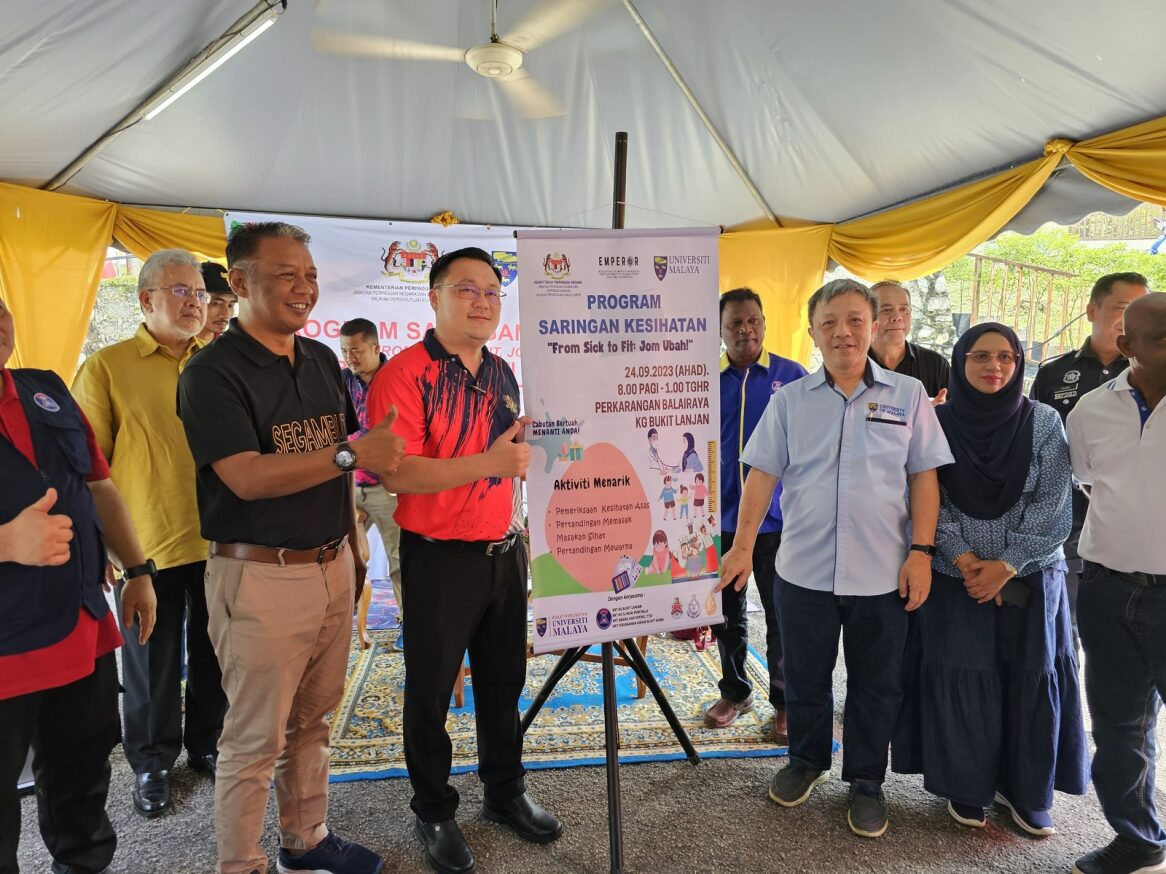
A community health screening program was conducted in collaboration with Jabatan Kesihatan Awam (JKA) PPUM at Kg Bukit Lanjan. The program was officiated by the Director of JPNIN Kuala Lumpur, YBhg Dr Beh Sang How. Approximately 200 participants from nearby neighbourhoods, including KRT Kg Bukit Lanjan, KRT Abg. Hj Openg, KRT Sg. Penchala and KRT Tun Dr Ismail attended the event. Among the attendees, around 25 families with children under six years old were invited to participate in a pilot study.
2. Courtesy Visit to Jabatan Perpaduan Negara dan Integrasi Nasional Wilayah Persekutuan Kuala Lumpur
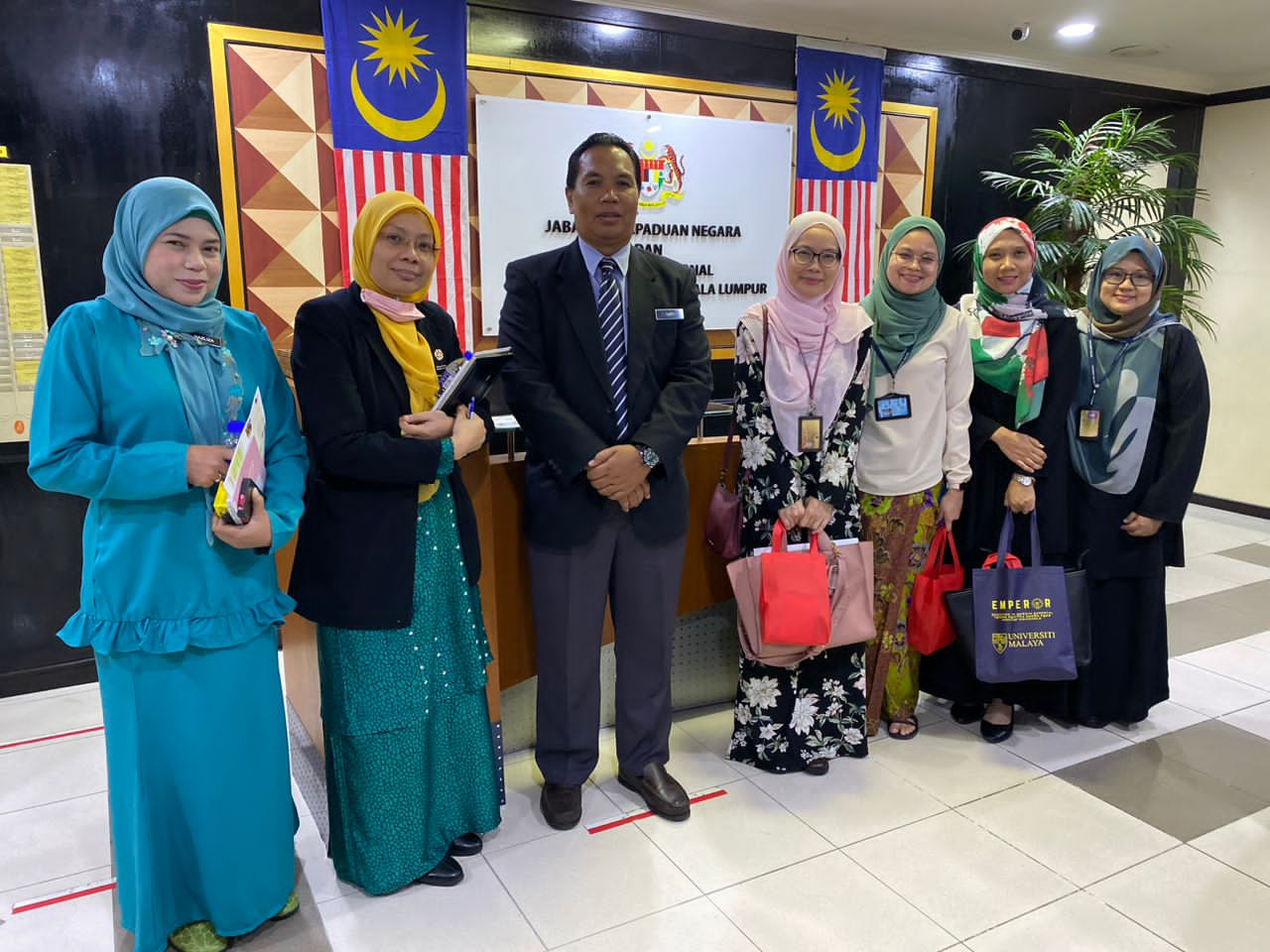
Following the success of the health screening program in Kg Bukit Lanjan, our team paid a courtesy visit to JPNIN WPKL, located at Menara TH Selborn, Jalan Tun Razak. During the visit, we presented findings from the pilot survey and discussed the plan to extend the research to include students of Tabika Perpaduan.
3. Health Screening Programme at Sentul District
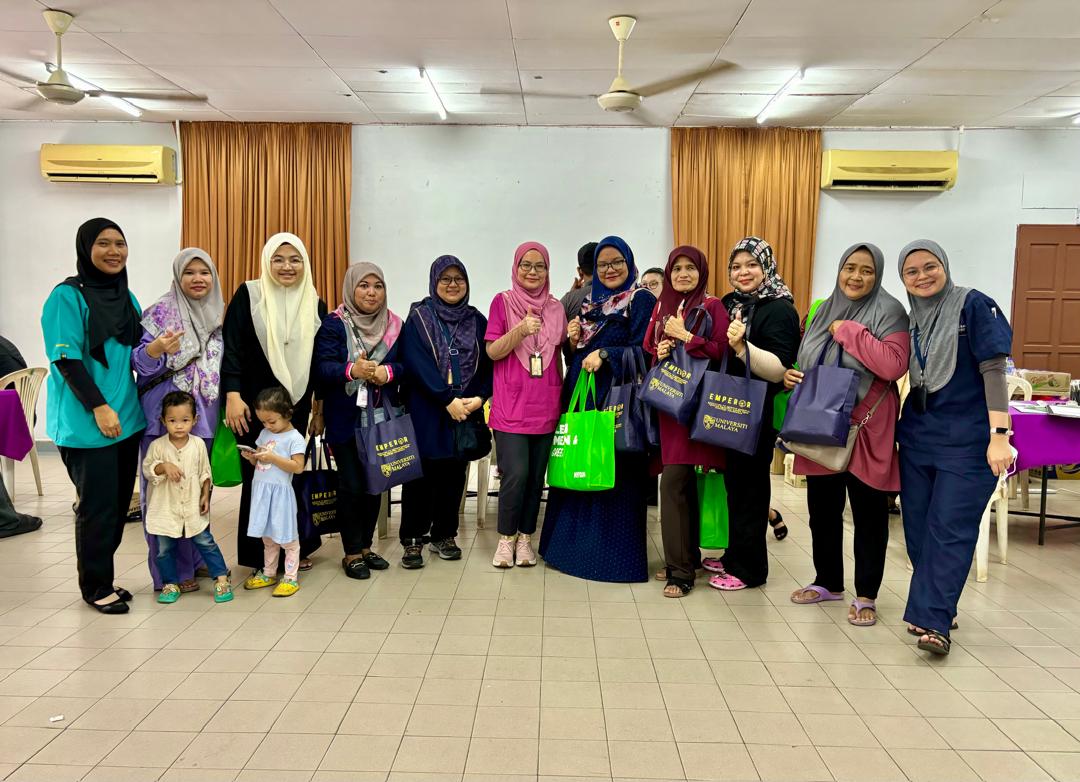
EMPEROR’s study once again teamed up with Jabatan Kesihatan Awam (JKA) PPUM to organise a health screening program and data collection involving kindergartens in Sentul district. Approximately 100 parents, children and teachers have attended the programme.
4. Meeting at National Health Institute (NIH) Setia Alam
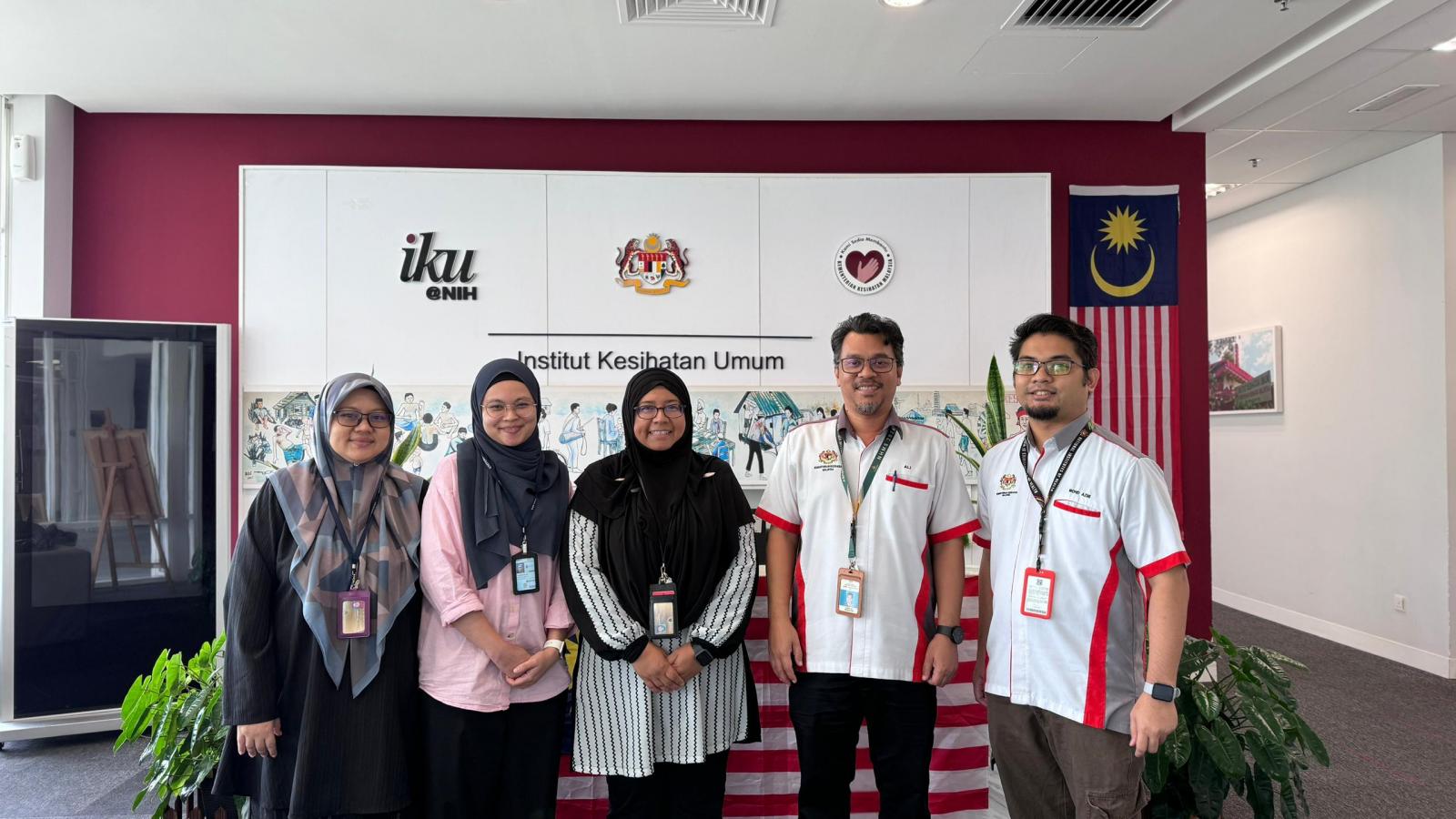
The EMPEROR team is proud to collaborate with Dr Ahmad Ali bin Zainuddin, Head of the Centre for Nutrition Epidemiology Research (CNER) at the Institute for Public Health, National Institute of Health (NIH). On 8th October 2024, we held a meeting with Dr. Ahmad Ali and Dr. Azmi to discuss matters related to food insecurity data analysis.
5. Forum on Sensor Technology and Integrated Machine Learning to Address Food Insecurity and Child Malnutrition
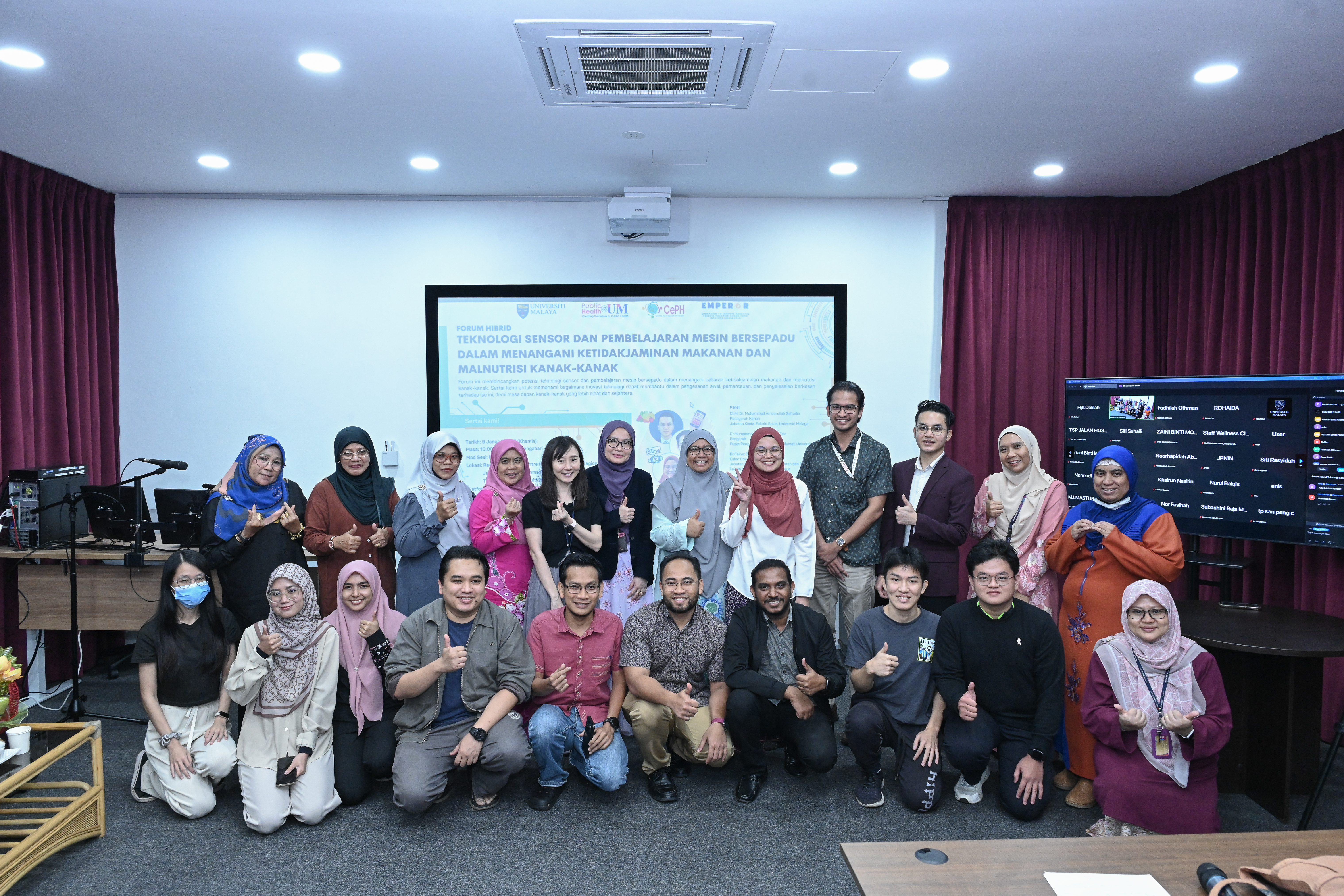
On 9th January 2025, the Forum on Sensor Technology and Integrated Machine Learning to Address Food Insecurity and Child Malnutrition was organised in collaboration with the Centre for Population Health (CePH). The forum, which took place at the Regional Training Centre in the Western Pacific Region, SPM Department, was attended by approximately 100 participants, both in-person and online. One of the panellists, Dr Fairuz Abd Rani has presented the findings from the Phase 1 EMPEROR study.
Acknowledgement
We would like to thank all the researchers and members who were involved and contributed to the EMPEROR project, especially the team from the IIRG work packages. Our gratitude extends to Chm. Dr Muhammad Amir Sahuddin and the team from WP1, Dr Muhammad Shahreeza Safiruz Kassim, and Dr Muhammad Faiz bin Mohd Zaki from IIRG WP3 for all the hard work and tireless effort towards this study.
We would also like to thank the SPM DrPH students, third-year medical students, Dr Nurnatasya, Ms Tik Maimunah, Ms Zoe Ong Pei Jing, Mr Darwish Isa, the JKA PPUM team, and other students and enumerators for all your contributions, especially in the data collection process.
Additionally, we extend our gratitude to all the stakeholders in this study; JPNIN Kuala Lumpur, KRT Kg. Bukit Lanjan, KRT Abg Haji Openg, KRT Sg Penchala, and KRT Taman Tun Dr Ismail, teachers, parents and children of Tabika and Taska Perpaduan were involved in this research.

Principal Investigator (PI): Associate Professor Dr Nasriah Zakaria, AlMaarefa University, Riyadh/ Faculty of Medicine, Universiti Malaya (Adjunct Professor)/ Member, Centre for Population Health, Universiti Malaya
Co-investigators:
Summary of the Project:
The project titled "Reusable Learning Objects for Neuroendocrine System and Mental Health Disorders Among Adolescents" focuses on enhancing mental health literacy (MHL) among adolescents aged 13-17 in Riyadh, Saudi Arabia, and Klang Valley, Malaysia. By examining these two comparable urban settings, the study addresses the pressing need for effective mental health education tailored for young individuals, especially since adolescents often require parental or guardian consent to participate.
The research will be conducted in two main phases. The initial phase involves adolescents completing questionnaires to assess their current levels of mental health literacy. Simultaneously, the research team will develop Reusable Learning Objects (RLOs)—multimedia educational materials designed for both academic settings and public health purposes. While RLOs have traditionally been utilized in higher education, their application in adolescent mental health education represents a pioneering approach.
The design and development of these RLOs will adhere to the ASPIRE framework, encompassing five key stages: Aim, Storyboard, Implementation, Release, and Evaluation. Following the completion of the storyboard, the implementation phase will utilize Xerte software, a platform that supports the creation of interactive learning objects. After two rounds of expert reviews (psychiatrists, psychologists and neuroscientists), the RLOs will be released to adolescents in selected schools across Riyadh and Kuala Lumpur. Each participant will engage with the RLOs that cover various mental health topics in an engaging format, which includes interactive functions such as flip cards, drag and drop, hotspot image, and multinavigators.
A cross-country analysis will be performed to identify any differences in mental health literacy levels between Saudi Arabia and Malaysia, which may guide future educational strategies and interventions.
Overall, this project not only aims to elevate mental health literacy among adolescents but also aspires to contribute significantly to the broader field of mental health education by showcasing the effectiveness of RLOs in diverse cultural contexts. By blending multimedia elements and evidence-based content into the learning experience, the project is expected to foster a more engaging and effective educational environment, ultimately promoting better mental health outcomes for young individuals in both Saudi Arabia and Malaysia.
Outcomes of the Project:

Principal Investigator (PI): Dr Ng Ai Kah
Co-investigators:
Summary of the Project:
The study assessing Muscularity-Oriented Disordered Eating (MODE) among youth, particularly in the South East Asia (SEA) region, has had a profound impact, which will unveil the true prevalence and nuances of this eating disorder. Thus, this study helps prompt targeted interventions tailored to the region's cultural and individual factors. Moreover, the clinicians gained a deeper understanding, leading to improved diagnosis and personalised treatments for MODE. Furthermore, the study's findings will foster international research collaboration.
Recognising similarities and differences in eating disorders globally encouraged cooperation among researchers from different countries within the SEA region. This collaboration facilitates the exchange of ideas and best practices, aiding in a more comprehensive understanding of eating disorders on a global scale. Ultimately, the study's impact lies in its contribution to tailored interventions, improved clinical approaches, and global collaboration, aiming to alleviate the burden of eating disorders, particularly the emerging MODE among Southeast Asian youth and beyond.

Principal Investigator (PI): Honorary Prof Dr Hazreen Abdul Majid
Co-lead: Dr Ng Ai Kah
Co-researcher: Zoe Ong Pei Jing
Summary of the Project:
Issues in nutritional status are gaining growing attention as increased Body Mass Index (BMI) affects nearly every bodily system and contributes to the emergence of non-communicable diseases (NCDs). According to the World Health Organisation, NCDs account for 41 million, which is around 74% of annual deaths worldwide, mainly due to cardiovascular diseases, cancer, chronic respiratory diseases and diabetes.
World Health Statistics 2023 also reported that the number of Disability-Adjusted Life Years from NCDs had increased from 47% in the year 2000 to 63% in 2019. Despite all these efforts, the global rate of adult obesity has continued to increase, with 2.5 billion (43%) people being overweight and 890 million (16%) being obese in 2022. In the local context, Malaysia’s prevalence of overweight and obesity was 30.4% and 19.7%, respectively, for adults 18 years and above.
Looking at the National Health and Morbidity Survey 2019 full technical report, 22.2% of those who were overweight were young adults aged 20 to 29 years, while 15.9% of the obese population were young adults. The Malaysian Health and Adolescents Longitudinal Research Team (MyHeART) study was the first initiative in Malaysia to collect information from in-school adolescents who were at the age of 13 years at baseline (2012) and were followed up at the age of 15 (2014) and 17 (2016) years.
The information was collected to investigate the risk factors of non-communicable diseases among adolescents by determining how lifestyle factors (e.g., diet, physical activity and high-risk behaviours) at early stages of adolescence may contribute to the development of chronic NCDs in early adulthood in Peninsular Malaysia. Currently, in the year 2024, participants from the study have entered a new stage of life as they grow into young adults 25 years old. This study will follow up on the MyHeART participants to collect new data on their nutritional status and dietary intake, which are major determinants of NCDs.

Principal Investigator (PI): Honorary Prof Dr Hazreen Abd Majid
Co-lead: Dr Ng Ai Kah
Co-researchers:
Summary of the Project:
Anaemia is a major public health concern impacting individuals of all ages worldwide. The 2019 National Health and Morbidity Survey indicates that 20.5% of Malaysian adolescents are affected by anaemia. The situation is particularly alarming among Orang Asli adolescents, where the prevalence can reach up to 50%. Hence, this study seeks:
This study comprises a systematic review and a cross-sectional study. First, a systematic review was conducted to analyse the literature on the burden and causes of anaemia among Orang Asli in Malaysia. The systematic review indicated an even greater prevalence of 68.4%, primarily linked to iron deficiency and soil-transmitted helminth infections, while other contributing factors included malaria, female gender, young age, low maternal education, and low household income (Munazieraa et al., 2024). Second, a cross-sectional study was carried out among 404 Orang Asli adolescents in two states, namely Pahang and Perak.
The cross-sectional findings as below:

Principal Investigator (PI): Dr Nithiah Thangiah
Summary of the Project:
This study aims to comprehensively assess the effectiveness of health kiosks in enhancing healthcare delivery and outcomes for underserved populations, particularly those with chronic diseases. With the rising burden of non-communicable diseases in Malaysia, this research seeks to leverage technology to bridge gaps in healthcare access and empower individuals to manage their health proactively.
This study will focus on specific objectives, including evaluating user satisfaction and identifying barriers to utilizing health kiosks. It will assess the impact of these kiosks on health literacy levels, measuring changes in knowledge, attitudes and practices related to chronic disease management before and after using the kiosk. Additionally, the study will determine improvements in access to healthcare services and health-seeking behaviour among underserved populations. Key health outcomes such as blood pressure and blood glucose levels will be monitored to evaluate the effectiveness of the health kiosk in managing chronic conditions.
Furthermore, the study will analyse the cost-effectiveness of deploying health kiosks in underserved areas. By focusing on these aims, the research hopes to provide valuable insights into how health kiosks can serve as an effective tool for improving health literacy, enhancing access to care, and ultimately contributing to better health outcomes in Malaysia’s underserved communities. The findings will inform policymakers and healthcare providers on strategies to optimize the use of technology in healthcare delivery, promoting equitable access and improved public health outcomes.
Content in progress.
Content in progress.
Content in progress.
Last Update: 07/04/2025